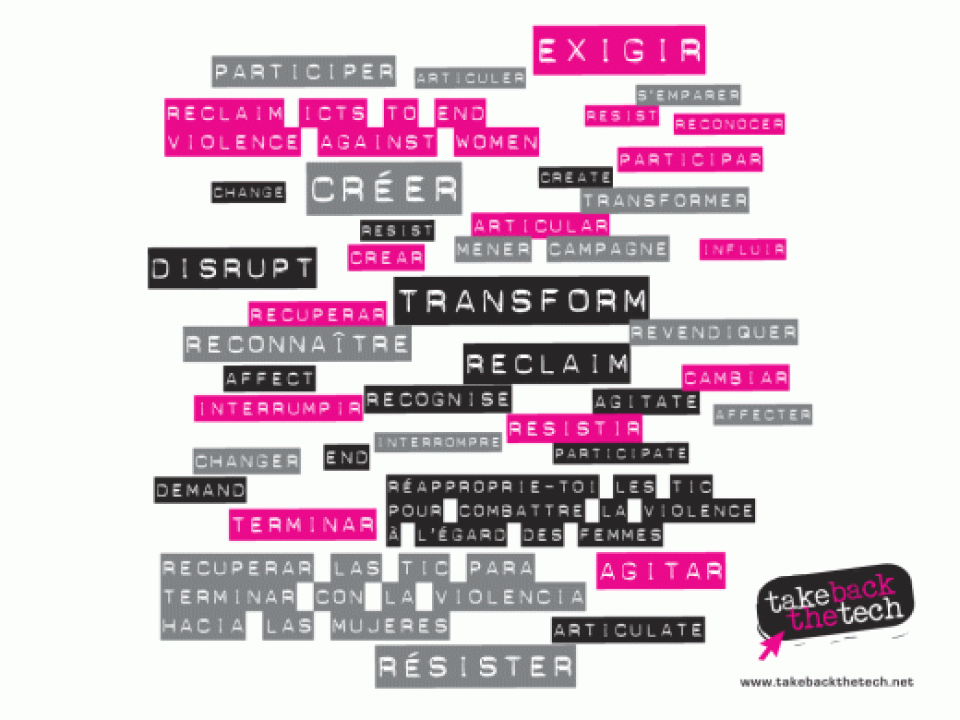
Take Back the Tech! started in November 2006 with a small but important idea: the increasing availability and reliance on new information technologies was transforming them into a political space, urgently in need of a feminist lens for engagement, understanding and envisioning. Women's contributions to the historical development of internet technologies were getting lost and forgotten, the reality of violence faced by women and girls all over the world was already seeping into online spaces and was not being given the attention needed.
The gendered culture of science and technology which acts to create hierarchies and alienation in technology use needed to be confronted and dismantled. At the heart of it, we had to take control of technology to define and shape a transformative space and platform, instead of one that becomes another form of structural inequality and discrimination.
The campaign began with no specific funding. From the research, training, networking and policy work that APC WNSP had done , we developed a strategy, built a basic (pure html!) campaign site and started a conversation with feminist activists and internet rights advocates from different parts of the world.
Clearly, the idea resonated. In the first year alone, we saw hundreds of bloggers, women's rights and civil society organisations and individual women and men talk about the issue, post the campaign icon on their site, change their status messages on emails and instant messaging services, create posters and start to Take Back the Tech.
Now, six years down the line, the campaign has grown tremendously through the collaborative participation of individuals, collectives and organisations who helped shape its vision, strategies and impact.
The campaign has expanded from a mostly online movement to one that weaves online and offline activism into a joint strategy and movement. Campaigners in Brazil organised trainings and workshops, partners in digital storytelling including Silence Speaks and Women'sNet shared their rich library of women and girls taking control of technology and their own experiences to create powerful video stories of transformation , feminist bloggers contributed posts about their experiences, insights and analyses of the issue, and more.
The most important part of the campaign is how it is taken up and organised in different spaces, and responds to local priorities and concerns about violence against women, feminism and the internet.
This year, Take Back the Tech! Pakistan took its campaign to rural parts of the country, collaboratively created 16 videos with 16 tribal women and amplified their claim and solidarity to the global 16 days campaign.
Women'sNet in South Africa organised a donation drive on used mobile phones for women.
The Fiji women's rights movement raised the issue of online security through the creative use of video.
Tweeple Florencia Goldsman brought her street theatre skills to digital arts events in Brazil with a performance on tech-related VAW.
Bloggers and organisations committed to 16 days of blogging around the issue with the Women and Media Collective in Sri Lanka called for conversations and creative expression on gender, media, sexuality and the internet, 'Stirring the Fire' posting about volunteer opportunities with organisations and projects working on VAW, survivor of rape Kate Ravenscroft writing about the 16 impacts of sexual assault each day with courage and brilliance and more.
It's impossible to describe the breadth, diversity and energy of the actions and initiatives that Take Back the Tech campaigners have organised in different parts of the world in less than a fairly thick book. They have truly inspired new ideas, creative engagement and the building of a global movement to end violence against women, both online and offline.
Two important gaps surfaced through the campaign over the years. One, the need for capacity building in online security that is grounded in the reality of women and girls; and two, the need for collaborative and systematic monitoring platforms to assess and understand the scope and dimensions of how technology and violence against women intersect.
Responding to this need, we developed online security resources for women and girls on mobile phones, online browsing, secure passwords, geolocation and portable applications. This edition of GenderIT.org also features a conversation with privacy rights activist, Gus Hossein, on the complex dimensions of the right to privacy and what is at stake in online spaces and communication.
We also launched the Take Back the Tech! online mapping platform to provide a space for the sharing and monitoring of stories and reports of technology-related violence against women. This pilot initiative was translated into 10 languages by local campaigners, including Bosnian, Lugandan, Arabic, Urdu and Portuguese, and with their collaboration, commitment and partnership, has documented more than 100 experiences and stories of women and girls who faced violence against women online or through the use of internet and mobile phone technologies.
These stories are already helping to surface key insights into the issue as can be seen through the article on initial analysis featured in this edition , and importantly, is providing a much needed platform for the recognition, expression and sharing of experiences and stories of survival. We hope that the map will continue to grow and become a useful space for feminist activists, women's rights organisations, internet rights advocates and individual users of the internet beyond the campaign.
It has been an amazing journey thus far, and this is just the beginning of women, girls and all of us in our diversity to Take Back the Tech! We hope you enjoy this edition that provides a great snapshot into this creative and groundbreaking movement.
Responses to this post
All is well and fine. It is a good and even necessary campaing. The only problem I have with it is that it is not inclusive. Somehow it forgets about boys and then again, it also forgets about men. Or are men better protected, less at risk, less liable to social, political, or economical control and abuse?
We are all human beings and not that different. We need to think of the human person, the collective and to be as inclusive as we can.
The goals of the Take Back the Tech are fantastic, all that has been done is amazing. Hope the energy carries on and becomes more aware an inclusive to all people in all walks of life.
Congratulations on what has been achieve so far.
Nick
- Add new comment
- 17480 views







Add new comment